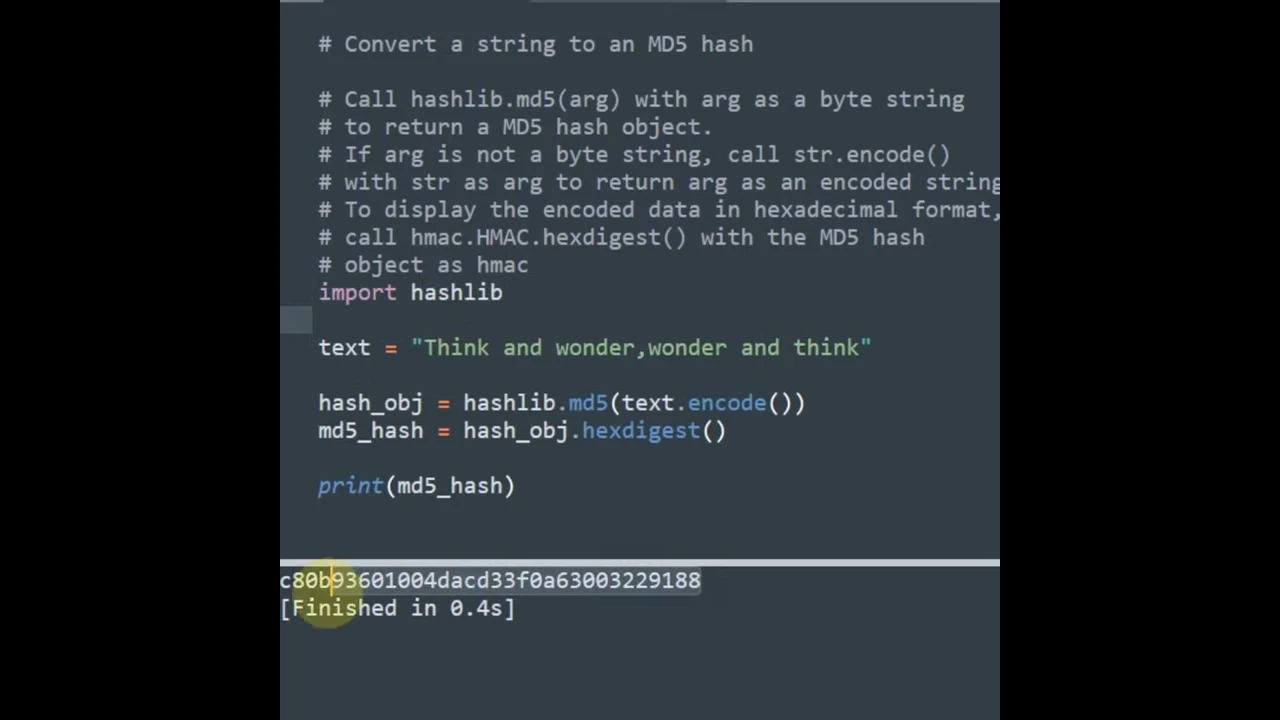Converting a md5 hash byte array to a string
Solution 1
public static string ToHex(this byte[] bytes, bool upperCase)
{
StringBuilder result = new StringBuilder(bytes.Length*2);
for (int i = 0; i < bytes.Length; i++)
result.Append(bytes[i].ToString(upperCase ? "X2" : "x2"));
return result.ToString();
}
You can then call it as an extension method:
string hexString = byteArray.ToHex(false);
Solution 2
I always found this to be the most convenient:
string hashPassword = BitConverter.ToString(byteHashedPassword).Replace("-","");
For some odd reason BitConverter likes to put dashes between bytes, so the replace just removes them.
Update: If you prefer "lowercase" hex, just do a .ToLower() and boom.
Do note that if you are doing this as a tight loop and many ops this could be expensive since there are at least two implicit string casts and resizes going on.
Solution 3
You can use Convert.ToBase64String and Convert.FromBase64String to easily convert byte arrays into strings.
Solution 4
If you're in the 'Hex preference' camp you can do this. This is basically a minimal version of the answer by Philippe Leybaert.
string.Concat(hash.Select(x => x.ToString("X2")))
B1DB2CC0BAEE67EA47CFAEDBF2D747DF
Solution 5
Well as it is a hash, it has possibly values that cannot be shown in a normal string, so the best bet is to convert it to Base64 encoded string.
string s = Convert.ToBase64String(bytes);
and use
byte[] bytes = Convert.FromBase64(s);
to get the bytes back.
Related videos on Youtube
Comments
-
Blankman almost 4 years
How can I convert the hashed result, which is a byte array, to a string?
byte[] bytePassword = Encoding.UTF8.GetBytes(password); using (MD5 md5 = MD5.Create()) { byte[] byteHashedPassword = md5.ComputeHash(bytePassword); }I need to convert
byteHashedPasswordto a string.-
 Kerrmiter about 3 yearsMD5 is deprecated. It is inherently broken as it does not reach the standards of collision or preimage resistance. For passwords, it's better to use iterated key-derivation functions such as Argon2 or PDKDF2.
Kerrmiter about 3 yearsMD5 is deprecated. It is inherently broken as it does not reach the standards of collision or preimage resistance. For passwords, it's better to use iterated key-derivation functions such as Argon2 or PDKDF2.
-
-
Blankman about 14 yearswhat is the significance of upper casing?
-
 Philippe Leybaert about 14 yearsa matter of preference. That's why I added a parameter to my method, so the caller can choose
Philippe Leybaert about 14 yearsa matter of preference. That's why I added a parameter to my method, so the caller can choose -
John Kugelman about 14 yearsIt's the difference between
c0deandC0DE, that's all. -
 Eric Petroelje about 14 yearsNo need to reinvent the wheel when you already have
Eric Petroelje about 14 yearsNo need to reinvent the wheel when you already haveConvert.ToBase64String() -
Blankman about 14 yearsoh ok, I thought there was more too it! how does your answer differ from Convert.ToBase64String(bytes)?
-
 Philippe Leybaert about 14 yearsA Base64 string is shorter. It uses all letters of the alphabet, digits and a few punctuation characters, so it's not hexadecimal. Base64 uses 4 characters for 3 bytes, while a hex string uses 6 characters for 3 bytes.
Philippe Leybaert about 14 yearsA Base64 string is shorter. It uses all letters of the alphabet, digits and a few punctuation characters, so it's not hexadecimal. Base64 uses 4 characters for 3 bytes, while a hex string uses 6 characters for 3 bytes. -
 Philippe Leybaert about 14 years@Eric: there are situations where Base64 is not a good choice because of the extra punctuation characters that are used (passing it in a URL for example)
Philippe Leybaert about 14 years@Eric: there are situations where Base64 is not a good choice because of the extra punctuation characters that are used (passing it in a URL for example) -
sonjz almost 11 yearsdoes the same as @PhilippeLeybaert solution, but in one-line.







